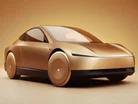Tesla's Cybercab and the Rise of Autonomous Vehicles

Automotive manufacturing continues to evolve as autonomous vehicles and AI merge to drive innovation.
With urban congestion and environmental issues posing challenges globally, tech companies and traditional carmakers are heavily investing in self-driving technology.
This shift towards autonomous transport is expected to revolutionise personal mobility, reshape urban environments, and potentially reduce traffic accidents.
A trailblazer in this area is Tesla, renowned for its electric vehicles and clean energy initiatives.
The company has just announced a new product that is making waves – a vehicle called the Cybercab.
What is Tesla’s Cybercab?
The Cybercab marks a major shift in Tesla’s focus from mass-market electric cars to AI-driven autonomous vehicles.
Revealed at the “We, Robot” event at Warner Bros Studios in Burbank, California, the Cybercab boasts a unique design with two seats and butterfly doors, and perhaps most notably, it lacks traditional controls like a steering wheel or pedals.
Tesla CEO Elon Musk stated the vehicle would be priced under US$30,000, with production anticipated to begin "before 2027".
However, this timeline is less certain than initially stated, possibly indicating the difficulties in bringing fully autonomous vehicles to market.
Alongside the Cybercab, Musk unveiled a concept for a larger autonomous vehicle called the Cybervan, with a capacity for up to 20 passengers.
These announcements indicate that Tesla is broadening its product range to include a variety of autonomous transport solutions as well.
The future of autonomous transportation
When it came to the safety and efficiency of autonomous vehicles, Musk expressed optimism.
The Cybercab is designed to rely on AI and cameras for navigation, rather than hardware like lidar, which is widely used by Tesla's competitors in the autonomous vehicle industry.
This strategy, though potentially more cost-effective, has been flagged by industry experts as both technically and regulatorily challenging.
Tesla aims to achieve operating costs of US$0.20 per mile for the Cybercab over time, with even lower costs anticipated for the Cybervan.
The company also plans to introduce inductive charging for these vehicles, eliminating the need for physical charging plugs.
However, industry analysts and experts have warned that rolling out a large-scale robotaxi service could take years due to regulatory obstacles and the need to ensure safety and reliability in diverse driving conditions.
Global impact and industry competition
Tesla's move into the robotaxi market puts it in competition with other tech companies and automakers with similar ambitions.
Alphabet's Waymo, an autonomous driving technology subsidiary, for example, already operates uncrewed robotaxis offering paid rides in parts of Phoenix and San Francisco.
Meanwhile, companies like Amazon’s Zoox, a subsidiary developing autonomous vehicles, are testing purpose-built autonomous models.
Elon states he expects to start fully autonomous unsupervised FSD in Texas and California specifically for Model 3 and Model Y vehicles in 2025.
Moreover, as cities around the world search for ways to cut traffic congestion and emissions, the success of initiatives like the Cybercab could shape future urban planning and transport policies.
While Tesla’s vision for autonomous vehicles is bold, it's worth noting that the company has encountered difficulties in fulfilling past promises about full self-driving capabilities.
The success of the Cybercab and similar ventures will rely not only on technological progress but also on overcoming regulatory hurdles and building public trust.
"We do expect actually to start fully autonomous unsupervised FSD in Texas and California next year,”Elon says.
“And that's obviously with the Model 3 and Model Y, and then we expect to be in production with the Cybercab which is really highly optimised for autonomous transport."
Make sure you check out the latest edition of Manufacturing Digital and also sign up to our global conference series - Manufacturing & Mobility LIVE
Manufacturing Digital is a BizClik brand
- Carbmee: Helping Maersk & Coca-Cola Curtail Carbon EmissionsSustainability & ESG
- Verizon Business: Predictions for Manufacturing in 2025Digital Factory
- ABB & Microsoft Launch Generative AI Copilot for IndustryAI & Automation
- Formula E: Shaping the Innovative Future of EV ManufacturingSustainability & ESG


